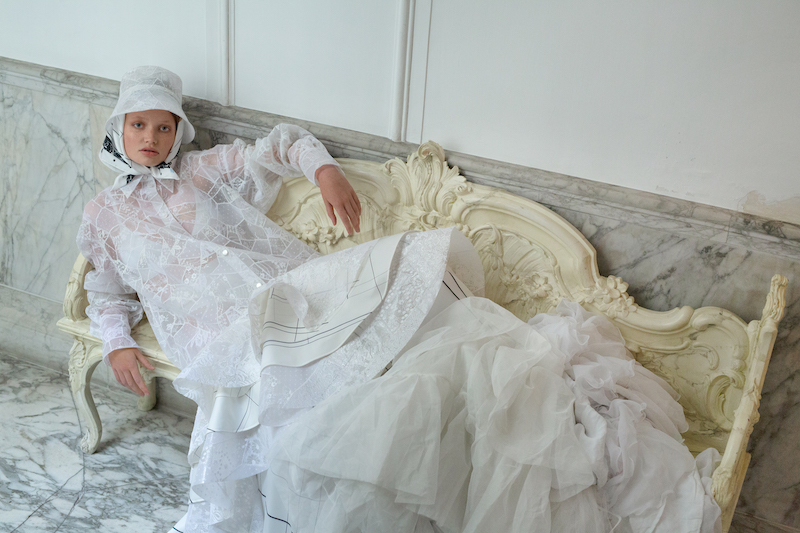While large-scale weddings are not currently possible due to COVID restrictions, many couples have opted for smaller, more intimate affairs instead. And with in-person fittings mostly off the cards, many brides have been rethinking their wedding dresses, including opting for more low-key—and sustainable—choices for their big day.
Despite not having a specific bridal line, eco-conscious brand Maggie Marilyn has certainly seen more interest from brides in her ready-to-wear pieces since the pandemic began. “With everything going on in the world right now, there is an element of brides toning it down a little bit, which feels fresh and modern,” the brand’s founder Maggie Hewitt tells Vogue. “Brides are choosing to wear pieces that align with their values when they get married, too, which is exciting.”

For those looking for a more traditional wedding gown, vintage has also become an increasingly popular choice for eco-minded brides. Lyst reported that searches for vintage wedding dresses were up by a staggering 297 per cent in the 48 hours after Princess Beatrice opted to borrow a 1960s Norman Hartnell dress from her grandmother, the Queen, for her wedding in July 2020.
Rental and upcycling are also on the rise, as brides become increasingly conscious of the environmental impact of a dress that you only wear once. Here is Vogue’s ultimate guide to sustainable wedding dresses in 2021.
Sustainable wedding dress brands to know

Designers such as Stella McCartney and Gabriela Hearst—both known for their sustainable practices—are obvious places to start your wedding dress hunt, but it’s also worth trying Maggie Marilyn, Mother of Pearl, and Reformation if you’re looking for a more relaxed option.
In fact, going for a style that “you can wear again and again” will only boost the dress’s sustainability credentials, Hewitt adds. That’s why Cecilie Bahnsen’s Encore range—made from leftover materials—is another fantastic option, featuring intricately crafted pieces that can be worn on your big day and beyond (especially when parties are finally allowed again).
Vintage and pre-owned wedding dresses
By wearing vintage on your wedding day, you’re not only extending the life of a pre-existing dress—it’s also likely to be a one-of-a-kind piece, making it an extra special choice. “It’s about customers wanting to make more meaningful purchases and wearing something unique; something with a story on their special day,” explains Marie Blanchet, founder and CEO of Mon Vintage.

With so much choice out there, it helps to narrow down what you’re looking for. Styles from the 1960s are trending at the moment, according to Blanchet, while other brides are opting for old-school Hollywood glamour from the 1930s and 1940s. The white pantsuit, too, is having somewhat of a resurgence thanks to the rise of the micro-wedding. Look for a vintage specialist who will tailor the pieces to your measurements, advises the expert, adding that it’s better to buy a piece that’s too big than too small.
If you’re looking for a modern pre-owned option, try bridal-specific marketplaces such as Still White and Brides Do Good, as well as resale sites like The RealReal and Vestiaire Collective. There you’ll find gowns by the likes of Carolina Herrera and Emilia Wickstead, all for a fraction of the price of a brand new wedding dress.
Renting a wedding dress
With rental fashion on the rise in recent years, it’s no surprise that more brides are considering renting a dress as their ‘something borrowed’. “It makes so much sense to rent if it’s just for that one day,” says Eshita Kabra-Davies, founder and CEO of rental app By Rotation, which now sees past brides loaning out their own wedding dresses (Cecilie Bahnsen, Jacquemus and Ganni are all popular options).
If you can’t find your dream dress to rent, it’s definitely worth considering borrowing your wedding day accessories instead—whether that’s a Simone Rocha handbag or a Shrimps faux-pearl headband to finish off your look.
How to upcycle your wedding dress

While wedding dresses typically end up in a box at the back of people’s wardrobes, many brides are now contemplating how they can give their gowns a second life. Bridal designer Alice Temperley has shown how to dye her dresses using natural materials while rising brands such as Wed Studio and Tess van Zalinge are turning old pieces into modern separates that can be worn day to day.
Ultimately, it’s about reducing waste as much as possible. As Van Zalinge explains, “You could buy a dress that you’re going to wear for just one day, but you have to think about what you could do with it afterwards.”





